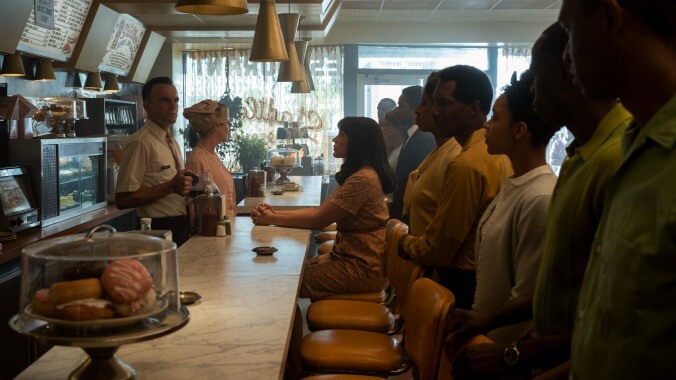“The Swedish Job” takes on a tall order. It wants to move the show’s central apocalypse story forward, deliver some sweet Hargreeves family reunions, and offer a moving tribute to the real-life heroism of Civil Rights activists. Though I have a few quibbles here and there, the fact that this episode largely pulls off its lofty goals is incredibly impressive. This season’s dual interest in its central apocalyptic throughline and the Hargreeves’ individual 1960s storylines helps ensure that everyone has something meaningful to do. And “The Swedish Job” also suggests The Umbrella Academy isn’t going to keep its characters locked in the same patterns they were last season, which is a refreshing change of pace.
That’s most true of Vanya, who I feared was once again going to be stuck in neutral until the end of the season. Thankfully, “The Swedish Job” doesn’t waste any time bringing her into the main storyline. Though her memories are still gone, her powers manifest when The Swedes try to kill her—leaving behind a perfect crop circle and a way for Five to track her down. Five recruits Vanya for Team Stop The Apocalypse Again, filling her in on (most) of the details that Luther neglected to tell her in the previous episode. (Luther really shouldn’t be put in charge of exposition.)
All things considered, Vanya handles Five’s summary of her wild life story really well. And the way Five describes the apocalypse as something that’s actively following the Hargreeves helps smooth over the idea that this season is just retreading the first. If that’s the case, it’s only because their destiny is chasing them. But this time around, Five doesn’t want to leave Vanya as a wildcard. Maybe the Hargreeves really can learn from their past mistakes.
Maybe. One big disconnect I’m feeling with this season so far is that idea that upon arriving alone in the 1960s, the Hargreeves all instantly assumed their siblings were dead and moved on with carving out new lives for themselves. It sort of makes sense for characters like Klaus and Allison, who arrived the earliest. (“The Swedish Job” opens with a delightful prologue detailing Klaus’ rise to accidental cult leader.) But is this really the first time Luther thought to ask his well-connected mobster boss to track down his siblings? What if they had just arrived in a different part of town?
That Luther could’ve found Allison any time during the past year is the sort of contrivance the writers really don’t want you to think about. But with a premise that invites a “what would you do in this scenario?” response, it’s hard not to. More than anything, I wish The Umbrella Academy would just bring some of those questions and contradictions to the surface, rather than pretending they don’t exist. Like, for instance, does reuniting with Klaus change how Allison feels about her decision to start a new life in the 1960s rather than try to find her siblings and get back to her daughter, who’s still set to die in a fiery apocalypse in 2019?
Perhaps those character reflections are still coming. Given that Klaus and Allison are the two Hargreeves siblings who don’t yet know about the impending 1963 apocalypse, it makes sense that they would assume they have plenty of time to sort things out. But I feel like this episode is missing a beat where we see how Allison and Klaus leave their incredibly sweet poolside reunion. Did they make plans to meet back up and search for their other siblings? Has this rekindled their hope of returning to 2019? Is that something they even want anymore?
Again, that’s a relatively minor quibble. If Allison and Klaus’ reunion feels a bit unfinished, their respective 1960s storylines are compelling enough to make up for it. In a subplot straight out of The Time Traveler’s Wife, Klaus goes to visit the younger version of Dave, the man he fell in love with during his first time travel trip to the Vietnam War in 1968 (five years in the future from Dave’s perspective). Thankfully, Klaus isn’t there to rekindle the romance with a teenaged version of his lover—instead he wants to save Dave’s life. Young Dave enlists the day Kennedy is shot, which gives yet another Hargreeves sibling a personal connection to the Kennedy assassination.
Allison, meanwhile, gets the climatic setpiece of the episode as she leads a sit-in at Stadtler’s whites-only lunch counter. Using a popular genre show with a big teen audience to shine a light on the Civil Rights movement is a worthy aim, especially when it comes to highlighting the way that protesters bravely and strategically endured violence as a tactic—something that can get elided by the term “non-violent protests.” And the scene where Allison pushes to go ahead with the sit-in despite the fact that her husband isn’t there to lead it is a welcome tribute to the many real-life women who played key roles in the Civil Rights movement only to be left out of the history books.
Perhaps because Allison is the Hargreeves with the strongest tie to 2019, she’s also the one who seems to have compartmentalized her 1960s life the most. Though she’s presumably desperate to see her daughter again, there’s an appeal in putting her messy past behind her and starting over too. She tells Klaus that it took her a full year to regain the ability to speak and that she hasn’t used her rumor powers since. For the first time in her life, she’s earned everything she has. Unfortunately, the past (or, well, the future) catches up to her anyway.
It does so via her husband, the wonderfully named Raymond Chestnut (Yusuf Gatewood). After Klaus frees Ray from jail and Luther stops by with a box of chocolates he proceeds to eat himself, Ray clearly has a ton of questions about his wife’s background and her strange white brothers. And he’s got even more once he finally sees Allison’s powers in action. She breaks her rumor-free streak to stop a policeman from beating him to death—a reminder that some images of brutality are tragically timeless in American history.
“The Swedish Job” puts a whole bunch of building blocks in place for the rest of the season. Though the Umbrella Academy is still fractured, at least the Hargreeves know they’re not alone. There are still several more reunions to be had (plus it feels like everyone should be way more excited about the idea of getting to chat to Ben through Klaus!), but the pieces are in place to bring the team together swifter than last season. Now we’ll just have to see how long it takes them to realize that Diego’s new British ally/lover has a devious family connection of her own.
Stray observations
- So, yes, Lila is the Handler’s daughter! Was she lying about her parents being murdered? Or did the Handler adopt her after it happened? Also, why does Lila have such a strong British accent if the Handler raised her?
- I continue to love how this season is revamping Diego into a more soulful, playful character. Lila brings out some fascinating dimensions in him, and David Castañeda and Ritu Arya are great together.
- Director Stephen Surjik brings some fun visual flair to this episode, especially in the shot of Elliot eating cereal in front of a magnifying glass.
- When Jack Ruby asks why Luther’s long-lost love is also named Hargreeves, Luther goes along with the idea that she’s his ex-wife, not his sister. Probably for the best.
- I’m guessing the reason Ben wanted to stay in San Francisco probably has something to do with the cute girl he was eyeing on the bus.
- I appreciate that The Umbrella Academy is regularly using flashbacks to help remind the audience of what happened last season. It’s something more plot-heavy bingeable shows should do.
- The Swedes is a fun name, but “The IKEA mafia” is even better.











![HBO teases new Euphoria, Larry David, and much more in 2026 sizzle reel [Updated]](https://img.pastemagazine.com/wp-content/avuploads/2025/12/12100344/MixCollage-12-Dec-2025-09-56-AM-9137.jpg)






























